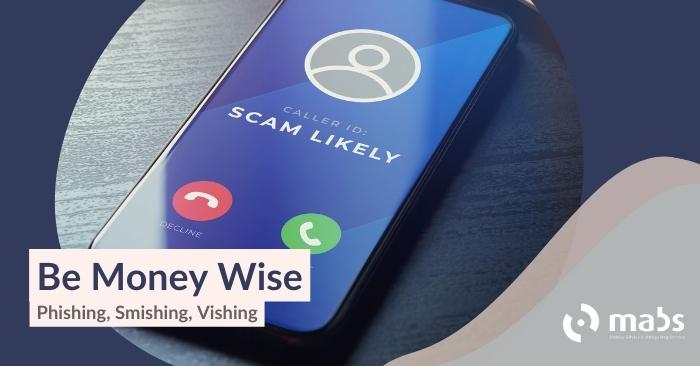Be Money Wise – Phishing, Smishing, Vishing!

In our weekly blogs, we like to share our top tips on budgeting and how to cut back on spending in order to save for the future. But we also want to make you aware of how to protect your money, when it comes to spending.
That is why, this week, we are going to look at scams and what to look out for.
Scams
Unfortunately, there are many dangers and scams with distrustful people trying to get our money.
Be smart and be aware when it comes to keeping our money safe. Have you come across any scams, especially online, in text messages or by email?
Let’s take a look at the different types of scams out there…
1. Phishing
‘Phishing’ relates to the sending of fraudulent emails, in which the person receiving the email is tricked into installing harmful software such as malware or into handing over sensitive information like a password or PIN, banking information, PPS number, or Eircode via a cloned website.
2. Smishing
‘Smishing’ is the text message equivalent of phishing. Phony messages usually ask the victim to open a hyperlink to “verify” or “reactivate” one of their online accounts. Typically, this can be their online banking, Revenue, or streaming service account. In other instances, scammers send messages made to look like notifications from delivery companies.
Again, clicking the link will either bring the person to a fake website where they are urged to provide personal information or to install what appears to be legitimate software but is actually malware.
3. Vishing
Lastly, ‘vishing’ relates to scams operated via phone calls.
Here, scammers have been posing as banks, Gardaí, Revenue officials, or another State body. They trick the victim into thinking they need to provide some form of sensitive information because one of their personal accounts has been compromised or because they are allegedly being investigated.
Taking Control
Our money is limited, so we should be careful sharing our financial information—especially online. Also, be suspicious of ‘too good to be true offers’ selling goods and services cheaper online. Avoid clicking on unfamiliar offer sites via social media.
Simply put, our money is hard-earned, and we need to protect it! Be careful shopping online and sharing financial details.
Make sure your passwords are complex so they are harder to hack. Don’t assume; always check. If possible, don’t click on links in texts and emails; instead, go directly to the service provider’s website and check your account. Verify by getting in touch with the service provider directly and asking them if they sent an email or text asking you to take action.
For more information on how to stay safe, visit Fraud Smart. Don’t forget to check out our Global Money Week page, where we discuss more important money topics, such as protecting our money, Buy Now Pay Later and how to save.
Contact Us
If you have a general money, budgeting or debt question, please call the MABS National Helpline on 0818 07 2000 Monday to Friday, from 9am to 8pm or find the contact details for your local office.
Don’t forget to follow us too at @MABSinfo – Facebook, Instagram, or X (Twitter).
Disclaimer: This blog does not represent legal advice and is intended for guidance only. If you are concerned about your current or future personal financial situation, then please contact an adviser from MABS. Advisers are available by phone, email and in-person in locations nationwide.
Note: We welcome references to and use of the content in this blog. However, please reference MABS and link said content if you choose to do so.




Facebook
twitter
Instagram